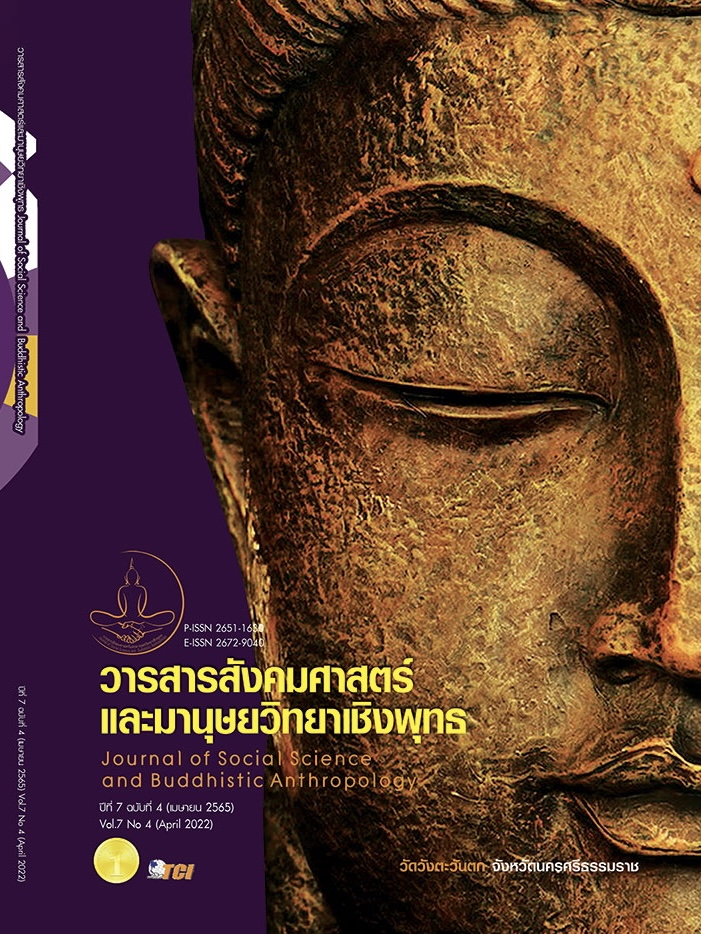A MODEL FOR DEVELOPING STUDENTS’ DESIRABLE CHARACTERISTICS ACCORDING TO THE PHILOSOPHY OF SUFFICIENCY ECONOMY FOR SCHOOLS UNDER THE CHAIYAPHUM PROVINCIAL ADMINISTRATIVE ORGANIZATION
Keywords:
A model for developing, students’ desirable characteristics, Philosophy of Sufficiency EconomyAbstract
The objectives of this research article were to 1) study the principal components and sub-components of students' desirable characteristics according to the Philosophy of Sufficiency Economy, 2) study the present condition of students' desirable characteristics according to the Philosophy of Sufficiency Economy, 3) to create and develop a model for students' desirable characteristics according to the Philosophy of Sufficiency Economy, and 4) to study the effects of using the model for developing students' desirable characteristics according to the Philosophy of Sufficiency Economy in schools under the Chaiyaphum Provincial Administrative Organization. This research is the research and development with 4 phases. The sample groups consisted of directors, heads of department and learner-development activities, teachers by purposive sampling and 353 students by using Krejcie and Morgan formula. The research tools consisted of: 1) In-depth interview 2) questionnaires. The statistics used in the data analysis were: 1) Qualitative data were analyzed by content analysis. 2) Quantitative data were descriptive statistics include percentage, mean, standard deviation. The results showed that 1) The component and sub-component of students' desirable characteristics according to the principle of the Philosophy of Sufficiency Economy consisted of 5 components with 58 sub-components. 2) The current conditions of students' desirable characteristics according to the Philosophy of Sufficiency Economy are overall moderate. 3) Creating a model for developing students' desirable characteristics according to the Philosophy of Sufficiency Economy using "5 Learning Bases to Sufficiency" applied to experiential learning and activities to enhance experiences in the classroom. 4) The experiment and evaluation usage results of the model for developing students' desirable characteristics according to the Philosophy of Sufficiency Economy were found that before using the model for developing students' desirable characteristics were performed at a moderate ( = 3.05, S.D. = 0.45), after using the model for developing students' desirable characteristics were raised to excellent all of components (
= 4.83, S.D. = 0.22). This confirms the students' desirable characteristics after using the model for developing students' desirable characteristics were different and statistically significant (0.05)
References
กระทรวงศึกษาธิการ. (2550). ยุทธศาสตร์การขับเคลื่อนปรัชญาเศรษฐกิจพอเพียงสู่สถานศึกษา (2551-2554). กรุงเทพมหานคร: ศูนย์ประสานงานกลางการดำเนินงานโครงการอันเนื่องมาจากพระราชดำริ.
กระทรวงศึกษาธิการ. (2553). หลักสูตรแกนกลางการศึกษาขั้นพื้นฐาน พุทธศักราช 2551. (พิมพ์ครั้งที่ 3). กรุงเทพมหานคร: โรงพิมพ์ชุมนุม สหกรณ์การเกษตรแห่งประเทศไทยจำกัด.
กุลยา อนุโลก. (2555). การพัฒนาพฤติกรรมการออมของนักศึกษาด้วยหลักปรัชญาเศรษฐกิจพอเพียง. ใน รายงานการวิจัย. มหาวิทยาลัยราชภัฏหมู่บ้านจอมบึง.
ฐิติยาพร ยอดไธสง. (2551). การพัฒนาการดำเนินงานเสริมสร้างคุณลักษณะที่พึงประสงค์ของนักเรียนโรงเรียนชุมชนบ้านนาแพง อำเภอนาโพธิ์ จังหวัดบุรีรัมย์. ใน วิทยานิพนธ์ครุศาสตรมหาบัณฑิต สาขาวิชาการบริหารการศึกษา. มหาวิทยาลัยมหาสารคาม.
ทรงศักดิ์ ภูศรีอ่อน. (2556). การประยุกต์ใช้ SPSS วิเคราะห์ข้อมูลงานวิจัย. (พิมพ์ครั้งที่ 6). มหาสารคาม: ตักศิลาการพิมพ์.
นำโชค วัฒนานัย และคณ. (2559). การพัฒนารูปแบบการเรียนการสอนแบบเน้นการเรียนรู้เชิงประสบการณ์ เรื่องจลนศาสตร์หุ่นยนต์. วารสารศึกษาศาสตร์ มหาวิทยาลัยมหาสารคาม, 10(4): 52- 64.
บุญชม ศรีสะอาด. (2556). การวิจัยเบื้องต้น. (พิมพ์ครั้งที่ 9). กรุงเทพมหานคร: สุวีริยาสาส์น.
ไพฑูรย์ สินลารัตน์. (2556). มูลนิธิสถาบันวิจัยและพัฒนาประเทศตามปรัชญาของเศรษฐกิจ. ใน เอกสารรายงานการประชุมคณะกรรมการมูลนิธิสถาบันวิจัยและพัฒนาประเทศตามปรัชญาของเศรษฐกิจพอเพียง. มูลนิธิชัยพัฒนา.
รัชนี ยมศรีเคน. (2551). การพัฒนาคุณธรรม จริยธรรม และค่านิยมที่พึงประสงค์ ตามมาตรฐานการศึกษาขั้นพื้นฐาน ของนักเรียนช่วงชั้นที่ 2 โรงเรียนอนุบาลกันทรวิชัยสำนักงานเขตพื้นที่การศึกษามหาสารคาม เขต 1. ใน วิทยานิพนธ์ครุศาสตรมหาบัณฑิต สาขาวิชาการบริหารการศึกษา. มหาวิทยาลัยมหาสารคาม.
วิสาร นามวา. (2558). การปลูกสร้างจิตสานึกในการอนุรักษ์ทรัพยากรธรรมชาติและสิ่งแวดล้อมแก่เยาวชนลุ่มนาโขง. ใน วิทยานิพนธ์ปรัชญาดุษฎีบัณฑิต สาขาวิชายุทธศาสตร์การพัฒนาภูมิภาค. มหาวิทยาลัยราชภัฏอุบลราชธานี.
ศูนย์ข้อมูลข่าวสารของราชการองค์การบริหารส่วนจังหวัดชัยภูมิ. (2556). แผนพัฒนาสามปีองค์การบริหารส่วนจังหวัดชัยภูมิ. เรียกใช้เมื่อ 6 มีนาคม 2562 จาก http://clinic.chpao.org/PDF/Information/3YearsPlan/Plan_56-58/Strategic
_1/1-5.pdf
สำนักงานคณะกรรมการพัฒนาการเศรษฐกิจและสังคมแห่งชาติ. (2560). แผนพัฒนาเศรษฐกิจและสังคมแห่งชาติ ฉบับที่ 12 (พ.ศ. 2560-2564). กรุงเทพมหานคร: สำนักนายกรัฐมนตรี.
สำนักวิชาการและมาตรฐานการศึกษา. (2552). แนวทางการพัฒนาการวัดและประเมินคุณลักษณะอันพึงประสงค์ ตามหลักสูตรแกนกลางการศึกษาขั้นพื้นฐาน พุทธศักราช 2551. กรุงเทพมหานคร: สำนักวิชาการและมาตรฐานการศึกษา.
สุวัฒน์ วัฒนวงศ์. (2555). จิตวิทยาเพื่อการฝึกอบรมผู้ใหญ่. กรุงเทพมหานคร: สำนักพิมพ์แห่งจุฬาลงกรณ์มหาวิทยาลัย.
อรพินทร์ ชูชม. (2552). วิธีการวิจัยทางพฤติกรรมศาสตร์และสังคมศาสตร์. กรุงเทพมหานคร: สถาบันวิจัยพฤติกรรม มหาวิทยาลัยศรีนครินทรวิโรฒ.
อัญชลี อินเอี่ยม. (2560). การพัฒนาแนวทางการเสริมสร้างคุณลักษณะด้านความพอเพียงของนักเรียนสังกัดสำนักงานเขตพื้นที่การศึกษามัธยมศึกษา เขต 19. ใน วิทยานิพนธ์ ครุศาสตรมหาบัณฑิต สาขาวิชาการบริหารการศึกษา. มหาวิทยาลัยมหาสารคาม.
John Dewey. (1983). Experience and Education. New York: Simon & Schuster.
Downloads
Published
How to Cite
Issue
Section
License
Copyright (c) 2022 Journal of Social Science and Buddhistic Anthropology

This work is licensed under a Creative Commons Attribution-NonCommercial-NoDerivatives 4.0 International License.









